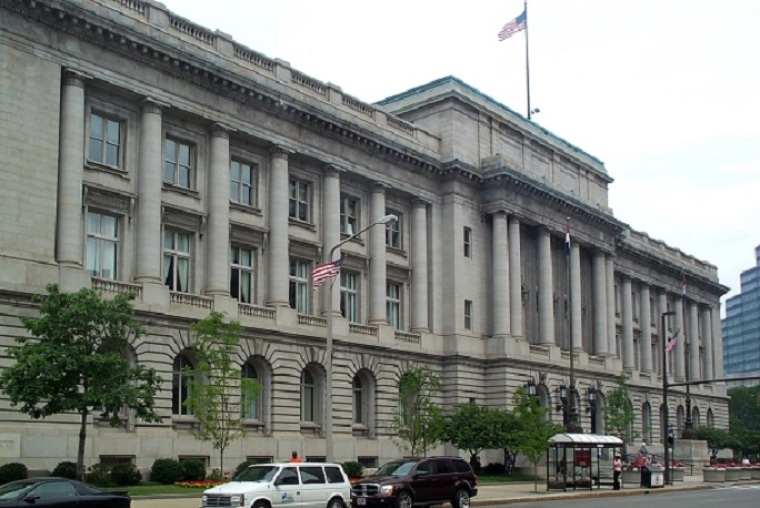Cleveland transgender bathroom rights bill set 'to strengthen' unlawful accommodations practices?

CLEVELAND, Ohio (Christian Examiner) – A Cleveland City Council committee discussed a transgender rights bill, Nov. 12, in a step to move it forward for consideration by the entire body.
The Workforce and Community Benefits Committee, chaired by Council Member Phyllis Cleveland, did not vote on the ordinance, and it still must be vetted by other committees before being debated by the full city council.
The legislation, sponsored by Councilmen Joe Cimperman and Matt Zone, is described as an "emergency ordinance" and strangely states its purpose is "to strengthen the unlawful discriminatory employment accommodations practices and unlawful employment practices based on gender identity and expression, and to increase penalties."
The measure, Ordinance 1446-13, gives transsexuals full access to "bathrooms, shower, locker rooms or dressing facilities consistent with their gender identity or expression." Although definitions of "gender identity and expression" are not defined in the bill, the legislation essentially permits individuals with a transgender identity to use any restroom or shower facility regardless of the actual biological gender of the person.
Much of the discussion in support of the provisions focused on inclusiveness in public accommodations in order to put transgenders at ease by letting them use the bathroom of their choice. The law does not include provisions to put non-transsexuals, minors or adults, at ease who are uncomfortable with using a restroom or shower facility with an opposite sex adult present.
The measure is being pressed at a time such provisions have been defeated in other cities, and at least one psychiatric expert is calling the transsexual rights movement a harmful craze.
Public outcry in Houston made the mayor -- an open lesbian -- delete such provisions in that city's controversial human rights ordinance. Petitioners also are fighting her denial of more than 50,000 signatures (three times the required number) -- validated by the city secretary -- asking for a city-wide up or down vote on the whole ordinance. That issue is headed for trial in January 2015.
Likewise, in 2012, the pushback by Jacksonville, Fla. voters was so strong against an expansion of LGBT rights that the city council rejected what was presented as an "anti-discrimination" bill by a 17-2 margin.
Meanwhile, such measures by government bodies have come under fire by a Johns Hopkins University expert. Paul R. McHugh led the school and hospital system to quit sex reassignment surgeries in 1979 in part because a "mutilated anatomy" did not resolve the underlying problem of a felt mismatch between identity and anatomy.
A venerated psychiatrist, researcher and educator, he is the University Distinguished Service Professor of Psychiatry at Johns Hopkins University, and served as Psychiatrist-in-Chief at the Johns Hopkins Hospital from 1975–2001.
In a June 12 Wall Street Journal editorial, McHugh said "'sex change' is biologically impossible," and policy makers and the media "are doing no favors either to the public or the transgendered by treating their confusions as a right in need of defending rather than as a mental disorder that deserves understanding, treatment and prevention."
Ironically, Cleveland's committee was discussing the matter the day after a report was released on The Federalist website about "regrets" transsexuals have expressed about gender transitioning, and the vignettes included stories of several high profile figures.
Senior contributor, Stella Morabito, included previous misgivings by Rene Richards who said "there are better choices, including medication, for dealing with the compulsion to cross dress and the depression that comes from gender confusion." Richards was a profesisonal teenager, who as a man-turned-woman became an icon for LGBT rights.
Morabito also highlighted the story of Los Angeles Times sportswriter Mike Penner, who announced in 2007 he was transitioning to a woman, only to de-transition in 2008, before killing himself in 2009 when he couldn't save his marriage.
The U.S. Centers for Disease Control and Prevention reports that less than 0.2. percent of the U.S. popuation is "something else" other than heterosexual, homosexual male, lesbian or bisexual. But, 0.4 percent of respondents replied "don't know" and another 0.6 percent declined to answer.
If the proposed legislation passes, businesses and other places of public accommodation that do not allow people to use the restroom without respect to gender identity would be guilty of discriminating and face a $1,000 fine, or up to 3 months in jail, or both. Exemptions include businesses with fewer than four persons, religious organizations whose service or membership is limited to a "single religious faith," religious educational institutions, private social or fraternal organizations, and any company where a religious creed is a condition for employment.
RELATED ARTICLES:
Cleveland mulls transgender 'bathroom rights' like those dropped by Houston
Houston transgender debate ignores scientific claim that transsexuality is a 'mental disorder'